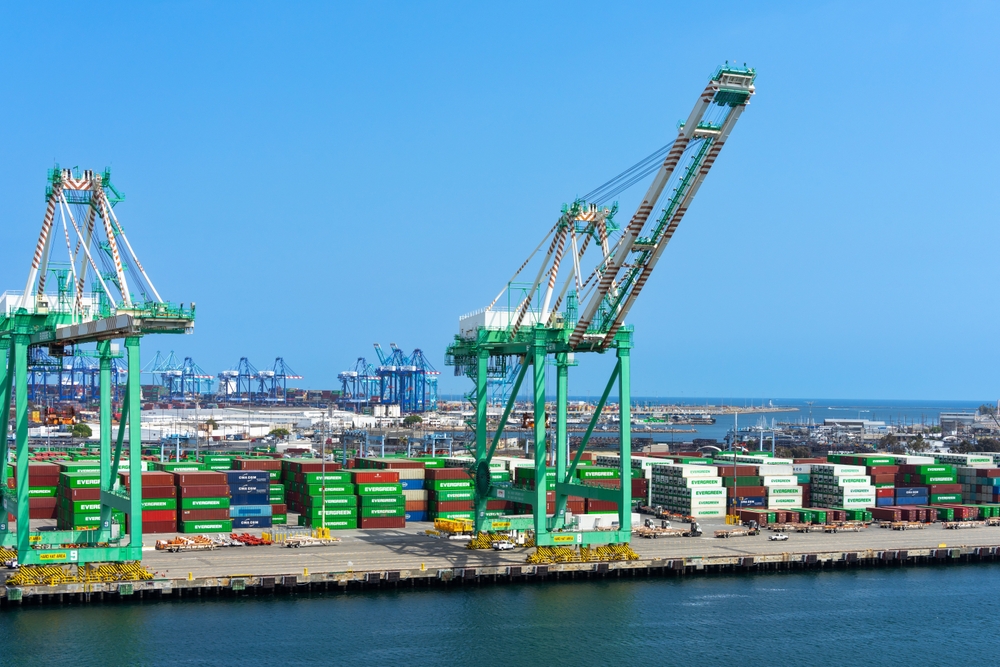While touring the Port of Savannah, Georgia, on May 5, 2023, EPA Administrator Michael S. Regan announced the initial steps in the development of programs that will invest $4 billion from the Inflation Reduction Act (IRA) in U.S. port infrastructure while reducing air pollution and advancing President Joseph Biden Jr.’s commitment to environmental justice.
Ports are critical for commerce and play a significant role in the goods movement supply chain.
The goal of the funding is to lower port emissions by 50% to 60%, says WTOC. “The money will be divided between upgrading vehicles and reducing other pollutants around the ports.”
Local Georgia labor leaders say they’re thankful for the funding.
“You’ll be in a cooler cab being in an electric vehicle, and its less noise. So, it makes the environment and your work environment much safer and [a] quieter place to work,” Local International Longshoremen’s Association President Paul Mosley Sr. said, according to WTOC.
“Local port leaders say the offer of federal funding will help their transition and any adjustments,” WTOC continues. “We can tweak here and there, be smart, and end up with a much better product for Savannah, for Georgia, and for the Southeast,” said Authority Board Chairman Joel Wooten.
“Thanks to President Biden’s historic investments in America, we are transforming our nation’s infrastructure for the better, all while protecting the health of underserved communities that are too often overburdened by pollution,”Regan stated in a news release.“With $4 billion in funding for clean ports and clean transportation from the [IRA], we can deliver cleaner air and healthier communities, support good-paying jobs, and strengthen local economies.”
The EPA previously awarded the Georgia Ports Authority with $9 million from Diesel Emission Reduction Act (DERA) funds to reduce diesel emissions and improve air quality by upgrading and replacing older freight trucks, cargo-handling equipment, and marine engines with cleaner models.
The Clean Ports Program builds on the EPA’s existing Ports Initiative and is predicted to transform port infrastructure while boosting investments for zero-emission port equipment and technology that reduce climate and air pollutants and improve air quality at ports and surrounding communities.
The Clean Heavy-Duty Vehicle Program provides funding to offset the costs of replacing heavy-duty commercial vehicles with zero-emission vehicles; deploy infrastructure needed to charge, fuel, and maintain these zero-emission vehicles; and develop and train the necessary workforce.
Together, these programs will invest resources in solutions to protect people and the environment. They also advance Biden’s Justice40 Initiative to direct 40% of the overall benefits of certain federal investments to disadvantaged communities.
“The Clean Ports Program will invest $3 billion in technologies to reduce harmful air and climate pollutants at U.S. ports and create a zero-emission shipping future,” adds the Agency news release. “The Clean Heavy-Duty Vehicle Program will invest an additional $1 billion to reduce vehicle emissions and better protect the health of the people living and working near ports, schools, and other truck routes.”
The initial EPA Request for Information (RFI) closed June 5, 2023, and sought to improve the Agency’s understanding of zero-emission trucks and port equipment, as well as their associated charging and fueling infrastructure requirements. The EPA also sought information detailing the availability, market price, and performance of zero-emission trucks, zero-emission port equipment, electric charging, and other fueling infrastructure needs for zero-emission technologies, as well as to what degree the content and components of these systems are manufactured in the United States. The Agency plans to use the information gained from the RFI to effectively design programs to expeditiously fund currently available zero-emission technologies and consider appropriate ways to accommodate technologies available in the near term.

